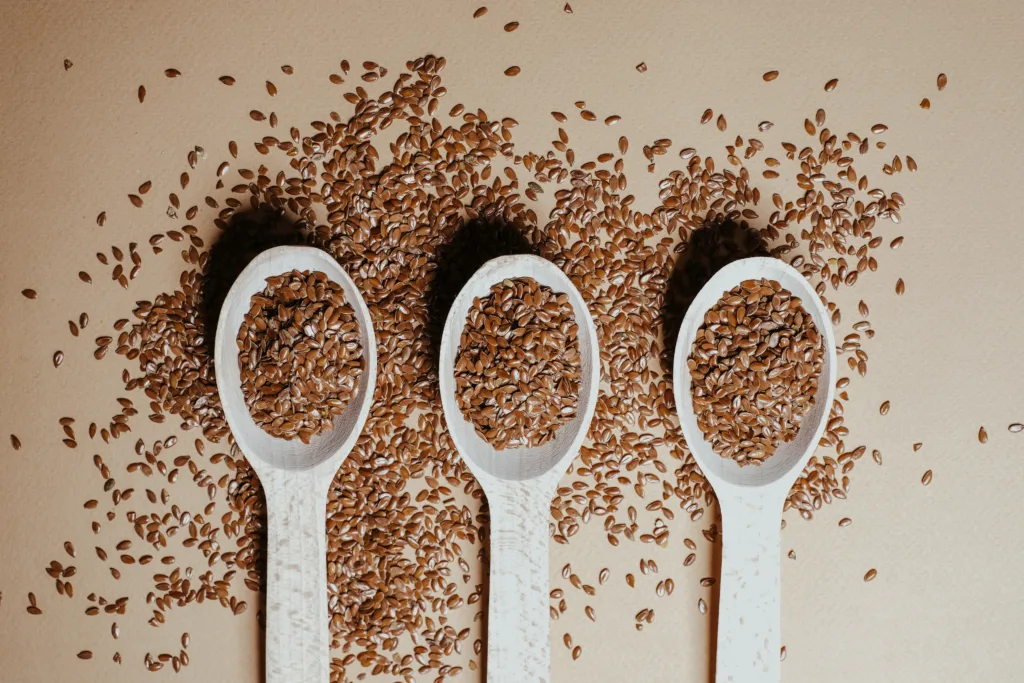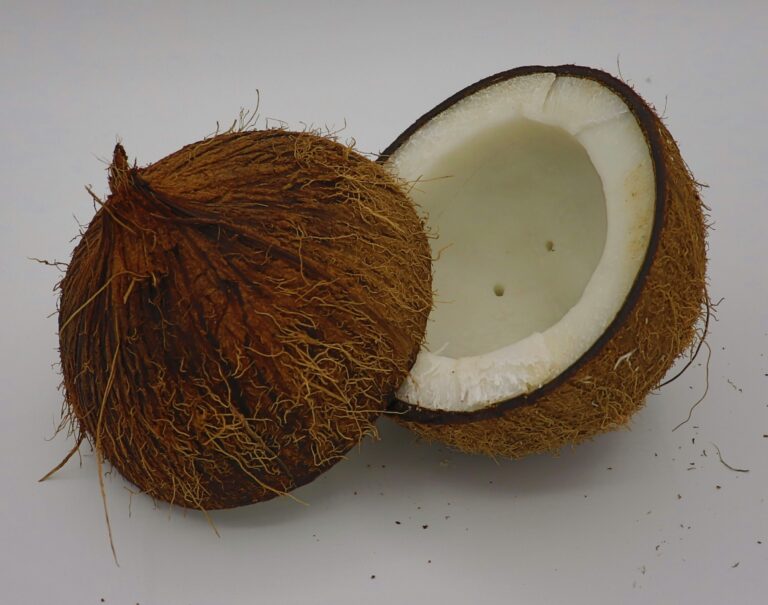Flaxseed, scientifically known as Linum usitatissimum, has a rich history spanning thousands of years. Its usage dates back to ancient civilizations, where it was highly valued for its nutritional and medicinal properties. Flaxseed cultivation originated in ancient Mesopotamia (modern-day Iraq and Iran) around 3000 BCE. It was one of the earliest cultivated plants, utilized for both food and fiber production.
Color: which varies in color from golden yellow to reddish brown
Shape: It bears small, oval-shaped seeds
Size: It is an annual plant that reaches a height of 1-1.5 meters., typically around 2-4 millimeters in size
Flavor: flaxseeds have a slightly mild and nutty flavor.
Nutrients
Flaxseeds are small but packed with nutrients that offer various health benefits. The usual serving size of ground flaxseed is 2 tablespoons. Here are the key nutrient facts about flaxseeds:
- Calories 75
- Carbohydrates 4 g
- Fiber 3.8 g
- Protein 2.6 g
- Vitamins and Minerals 90 mg
- phosphorus 55 mg
- magnesium 114 mg
- Omega-3 Fatty Acids 7.6 g fat (9.23 percent DV) — flaxseed is one of the best sources of omega-3 fatty acid alpha-linolenic acid (ALA)
| How to grow flaxseeds? |
Choose a suitable location, Flax prefers full sun and well-drained soil. Loosen the soil and remove any weeds or debris. Flax grows best in slightly acidic soil with a pH between 6 and 7. Scatter the flaxseeds evenly over the prepared soil and lightly rake them in. Flaxseeds should be sown about half an inch deep. Flax requires consistent moisture, especially during germination. Keep the soil evenly moist but avoid overwatering, as it can lead to root rot. Regularly remove weeds around the flax plants to minimize competition for nutrients and space. Harvest flaxseeds when the lower leaves turn yellow and the seed capsules turn brown. Pull the plants out of the ground, bundle them together, and hang them upside down in a cool, dry place. Once dry, thresh the plants to separate the seeds. Store the harvested flaxseeds in airtight containers in a cool, dark place to maintain their freshness.
Remember to check regional guidelines and adapt this process accordingly to your specific climate and conditions.
Healthy Benefits of flaxseeds
It’s important to note that while flaxseeds offer numerous health benefits, they should be consumed in moderation and may interact with certain medications. It’s advisable to consult a healthcare professional before making significant changes to your diet or incorporating flaxseeds into your routine.
Heart Health
Flaxseeds promote heart health by reducing cholesterol levels, lowering blood pressure, and improving blood vessel function.
Omega-3 Fatty Acids
Flaxseeds are rich in alpha-linolenic acid (ALA), an omega-3 fatty acid that supports brain health, reduces inflammation and improves heart health.
Digestive Health
The high fiber content in flaxseeds aids digestion, prevents constipation, and promotes regular bowel movements.
Hormonal Balance
Flaxseeds contain lignans, which have estrogenic properties and may help regulate hormone levels, especially in women.
Cancer Prevention
The lignans and antioxidants in flaxseeds have been linked to a reduced risk of certain cancers, including breast, prostate, and colon cancers.
Blood Sugar Control
Flaxseeds may help stabilize blood sugar levels, making them beneficial for individuals with diabetes or insulin resistance.
Weight Management
The combination of fiber, healthy fats, and protein in flaxseeds can promote satiety, helping to control appetite and support weight management.
Skin Health
Flaxseeds’ omega-3 fatty acids and antioxidants contribute to healthy skin, reducing dryness, and inflammation, and promoting a youthful appearance.
Bone Health
Flaxseeds contain minerals like calcium, magnesium, and phosphorus, which are essential for maintaining strong bones and preventing osteoporosis.
Anti-Inflammatory Effects
The omega-3 fatty acids and lignans in flaxseeds possess anti-inflammatory properties, potentially reducing inflammation in the body.
Side Effects of flaxseeds
It’s important to consume flaxseeds in moderation and consider individual sensitivities or allergies. If you experience any adverse effects or have concerns, it’s recommended to consult a healthcare professional for personalized advice. However, some individuals may experience certain side effects, including:
Digestive Issues
Flaxseeds are high in fiber, which can cause bloating, gas, and abdominal discomfort, especially if consumed in large quantities or if you’re not accustomed to a high-fiber diet. It’s recommended to start with small amounts and gradually increase intake to allow your body to adjust.
Diarrhea
Excessive consumption of flaxseeds, especially when combined with inadequate fluid intake, may lead to loose stools or diarrhea. Ensure you drink plenty of water when consuming flaxseeds to prevent dehydration.
Allergic Reactions
Although rare, some individuals may be allergic to flaxseeds. Allergic reactions can range from mild symptoms like itching and hives to more severe reactions like difficulty breathing or anaphylaxis. If you have known allergies, it’s advisable to consult an allergist before consuming flaxseeds.
Interference with Medications
Flaxseeds may interact with certain medications, including blood thinners, hormone therapies, and some medications for diabetes. They can affect the absorption or effectiveness of these medications. Consult your healthcare provider if you are taking any medications to ensure they won’t be adversely affected.
Cyanide Content (Linamarin)
Flaxseeds naturally contain a small amount of linamarin, which can release a small amount of cyanide when metabolized. However, the levels are generally considered safe for consumption. Cooking, baking, or roasting flaxseeds can help reduce the linamarin content.
FAQ
Is it OK to take flaxseed every day?
Yes, it’s fine to consume flax seeds every day, but 1-2 tablespoons or 28 grams a day is considered a healthy amount.
Is flaxseed good for females?
Flax seeds not only help women with their hair and skin but are also good for balancing hormones. Lignans, which are found in flaxseeds and have estrogenic qualities, may assist in regulating hormone levels, particularly in women.
Is it good to soak flax seeds overnight?
Flax seeds are easier to digest after being soaked in water overnight because it starts the germination process, which activates the enzymes.






